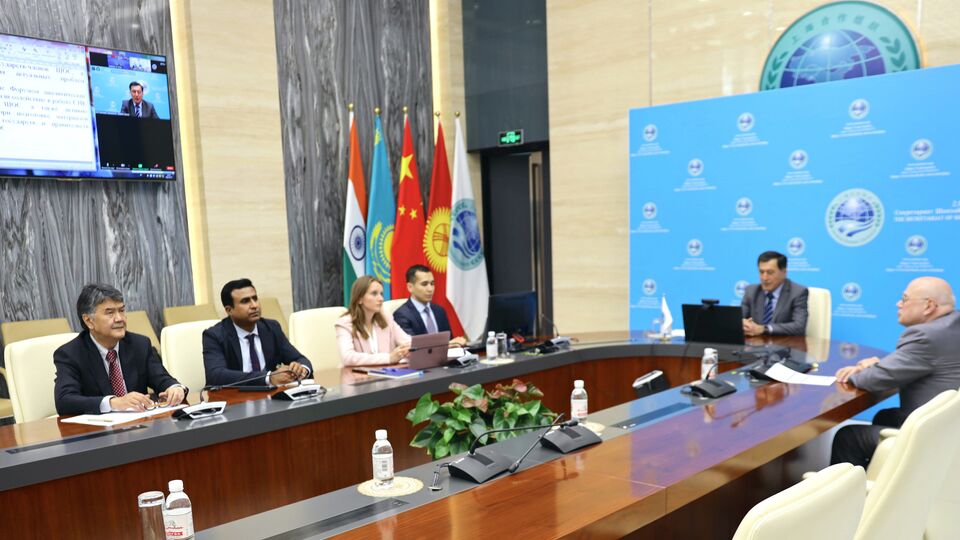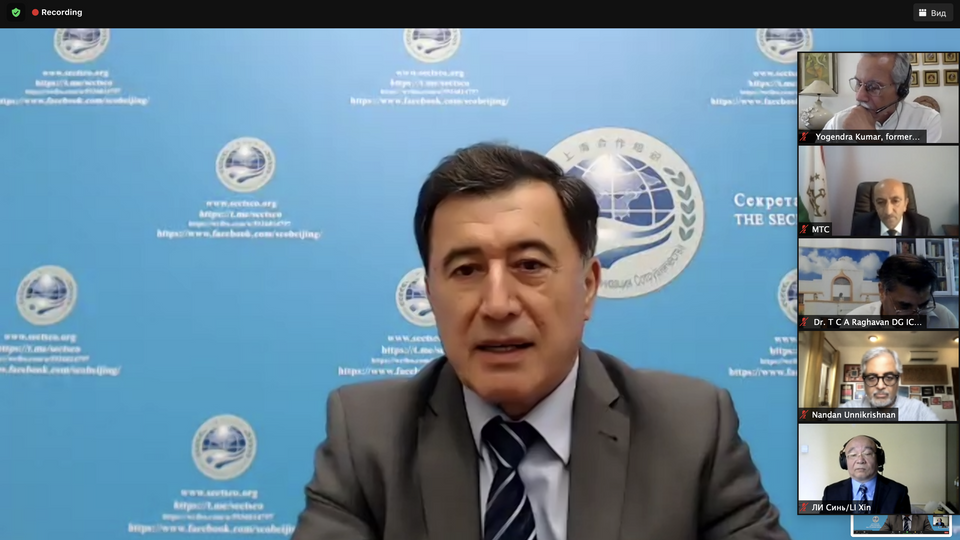The 16th SCO Forum, held via videoconference on 25 May 2021, was organised by the Institute of Strategic Studies Islamabad (ISSI) with the support of the Pakistani Ministry of Foreign Affairs. It was attended by over 30 scientists, experts and political analysts from China, India, Kazakhstan, Kyrgyzstan, Pakistan, Russia, Tajikistan and Uzbekistan.
Opening remarks were delivered by ISSI Director General Aizaz Ahmad Chaudhry, SCO Secretary-General Vladimir Norov and Aisha Farooqui, National Coordinator SCO Pakistan.
SCO Secretary-General Vladimir Norov pointed out that the 16th Forum meeting was held in a complicated geopolitical environment when positive unifying factors are being "washed out" of the global agenda, methods of dialogue are being replaced with the use of force and pressure, the adoption of illegitimate sanctions is becoming usual practice, and the international mechanisms that helped maintain global stability and security for many decades are being dismantled one after another. What is happening when it comes to trade and economic relations is no better, with protectionist trends gathering momentum and increasingly more attempts are being made to erode the fundamental principles of international trade formalised as WTO recommendations.
The coronavirus pandemic has delivered a heavy blow on the global economic ties. The transnational production chains have been undermined and traffic flows have been all but blocked, which is having a negative effect on trade and economic cooperation within the framework of the SCO. The coordination of anti-crisis measures and collective actions that will take into account the economic decline caused by the pandemic has become one of the SCO's key priorities. It is therefore logical that the subjects of trade and economic cooperation have been put on the agenda of the 16th Forum.
The SCO Secretary-General noted that over a period of the 16 years since it came into being, the Forum had become a vital platform for dialogue between the SCO countries' research and analytical centres and also for discussing the current aspects of the SCO's functioning. Analytical material prepared by the Forum is being used by the SCO Council of National Coordinators and the SCO Secretariat in their daily activities, as well as to prepare documents for the meetings of the SCO heads of state and government.

Vladimir Norov believes that the time has come to rethink the role of the Forum in the current system of cooperation and to give a new meaning to its activities, specifically with a view to upgrading it to an SCO Institute of Analysis and Forecasting.
This view was supported by Yerzhan Saltybayev, Director of Kazakhstan's Institute of World Economics and Politics (IWEP) under the Nursultan Nazarbayev Foundation. He spoke about the importance of creating and applying special mechanisms for holding videoconferences of the SCO countries' research centres to discuss the current matters facing the SCO countries.
Alexander Lukin, Director of the Centre for East Asian and Shanghai Cooperation Organisation Studies at the Moscow State Institute of International Relations University (MGIMO University) of the Ministry of Foreign Affairs of Russia, pointed out in his remarks that although the SCO countries are cooperating in a broad range of spheres, they are currently only focusing on security.
Vice President of the China Institute of International Studies Rong Ying noted that respect for the principle of openness was helping SCO Family countries to consistently expand interstate contacts and to deepen relations of mutually beneficial partnership.
Abror Madimarov, Senior Research Fellow at the Institute for Strategic and Regional Studies under the President of the Republic of Uzbekistan (ISRS), said in his remarks that in light of the increasing challenges and threats, the SCO countries' research communities should demonstrate an ability to adjust to the new realities to address fundamental security topics in the SCO space.
ISRS Deputy Director Sanjar Valiyev pointed out: "The spirit of mutual respect that permeates SCO relations is becoming increasingly attractive for the countries of Asia and beyond."
ISRS Deputy Director Sanjar Valiyev pointed out: "The spirit of mutual respect that permeates SCO relations is becoming increasingly attractive for the countries of Asia and beyond."
Saodati Hursand Jurahonzoda, Deputy Director of the Centre for Strategic Research under the President of the Republic of Tajikistan (CSR), believes that the mobilisation of the SCO member states' technological, financial, human and natural resources would promote the development of relations needed to implement joint programmes and projects aimed at stimulating sustainable production and consumption formats, innovative development in various economic sectors, as well as the protection and rational use of natural resources.
Syed Khalid Amir Jaffery, President of the Pakistani Centre for Global and Strategic Studies (CGSS) and moderator of the Forum's first session, noted that the SCO was one of the main security and stability factors in Eurasia and an integral part of the system of regional and international politics and security.
Former Indian ambassador to Tajikistan Yogendra Kumar supported this view, adding that during its 20-year long history, the SCO had become an influential international organisation with a proactive regional security policy ensuring a "soft geopolitical balancing" of the main regional players.
All the participants agree that the SCO has made great strides in the development of business partnership and has created conditions for a breakthrough in the sphere of practical projects. They also believe that the time has come to make use of these possibilities.
Those attending the event discussed and analysed the most promising spheres for the SCO's further development amid the COVID-19 pandemic. They called for coordinating efforts, exchanging information and providing mutual assistance to overcome the negative socioeconomic consequences of the pandemic.
Overall, the participants in the Forum spoke highly of the SCO's achievements during its 20-year long history. The attending heads of research centres reaffirmed their commitment to building up research and analysis cooperation within the SCO and also called for expanding the agenda for scientific discourse, including at other expert platforms.
The participants confirmed their resolve to increase the Forum's role in the SCO with a view to its institutional reform.
ISSI Director General Aizaz Ahmad Chaudhry said in conclusion that the ideas put forth at the meeting would be taken into account during the discussion of the new approaches to addressing the practical tasks of promoting multifaceted cooperation within the framework of the SCO.
